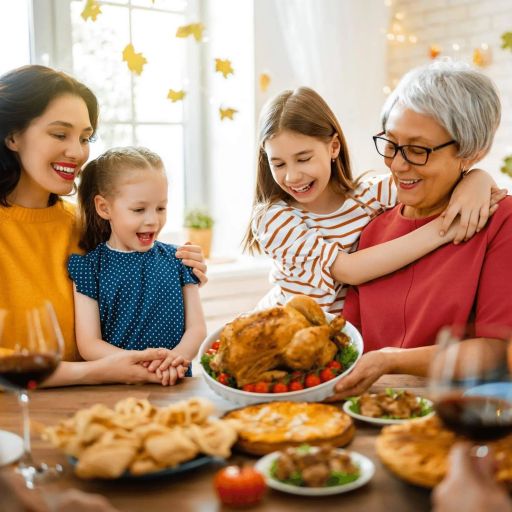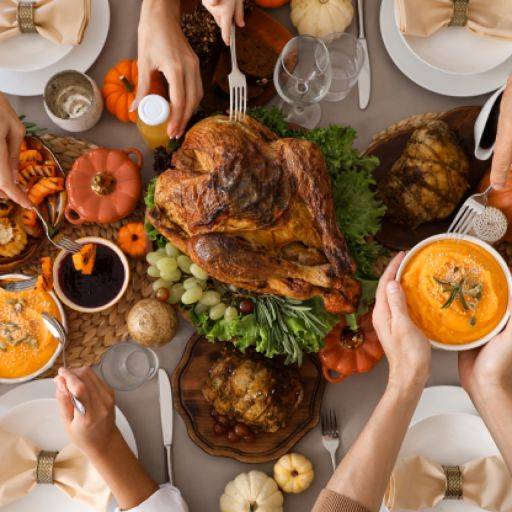Advertisement
Thanksgiving is one of the most important holidays of the year for every American, especially for the older age groups. For seniors, Thanksgiving is not only a time for thanksgiving and fellowship, but also a time to reminisce, cherish family, and pass on traditions.
Every year on the fourth Thursday of November, seniors are often filled with strong emotions and feelings as the family sits around the table and shares turkey and pumpkin pie.
The Meaning of Thanksgiving: Gratitude and Memories
For many seniors, Thanksgiving is about much more than a great meal. It holds many of their personal memories and emotional experiences. It's an opportunity for them to look back on their entire lives-the Thanksgivings they've experienced, the people they've celebrated with, and the family traditions of the past.
Thanksgiving also provides an opportunity for seniors to express gratitude. They have lived through decades of life and have witnessed many changes, whether it be technological advances, social changes, or growth and change within the family.
Older adults tend to value reunions with family more, and Thanksgiving is an emotional high point for them, as they appreciate all that they have been given in life: health, family, friendships, and loved ones who are still around to be with them.

The Heart of Family Reunion
At the heart of Thanksgiving is the family reunion. For many seniors, seeing their children and grandchildren is one of the most important parts of Thanksgiving. Spending Thanksgiving with their children and grandchildren is not just a family tradition, but an opportunity for them to feel the bonds of family again.
Family visits are especially valuable for seniors who are physically challenged or who have entered a nursing home. Thanksgiving provides an opportunity for families to let go of their everyday busyness and focus on spending time with their senior family members.
Seniors often value this face-to-face time the most because they know that these opportunities become more and more valuable as they age.
Continuing and Passing on Traditions
Thanksgiving is also a time for seniors to pass on family traditions. Many families have Thanksgiving menus and celebrations that have been passed down through generations, and seniors are often the keepers and bearers of these traditions.
From how to cook the turkey, to specific pumpkin pie recipes, and even certain family-unique holiday activities, seniors take on the responsibility of passing on these cultural practices.
For some seniors, they use Thanksgiving as an opportunity to share the stories behind these traditions with younger generations. For example, they may recount how they spent the holiday with their family when they were younger, or how their grandparents spent Thanksgiving.
Sharing in this way is not only a nostalgic look at the past, but also a hope that the younger generation will understand and continue these family traditions.

Advertisement
The Spirit of Thanksgiving: Gratitude, Giving and Giving
As they age, seniors are more likely to recognize the true meaning of the spirit of Thanksgiving - gratitude and giving. During Thanksgiving, many seniors are not only thankful for what they have, but also focus more on how they can give back to others.
Even after retirement, many seniors are still willing to show their gratitude to the community by donating, volunteering, or contributing their time and energy to the community.
For example, during Thanksgiving, some seniors will join a community charity meal to help provide a Thanksgiving meal for those who are homeless or in financial need.
This spirit of selfless giving is one of the core values of Thanksgiving, and older adults are often active participants and supporters of such events.
Change and Adaptation
However, over time, Thanksgiving has also been fraught with challenges of change and adaptation for older adults. For some older adults, the way Thanksgiving is celebrated may have to be adjusted due to the loss of a family member, a health issue, or a change in economic conditions.
Some seniors may feel lonely because of the loss of a spouse or friend, especially during a holiday that is supposed to be a time of reunion.
For seniors living in nursing homes or alone, Thanksgiving can become simpler and even slightly sadder. However, many communities and nursing homes host special events for seniors during Thanksgiving that provide opportunities for socialization and companionship.
These events help seniors find new ways to celebrate Thanksgiving, even if their life circumstances have changed.

The Impact of Technology
In recent years, advances in technology have also opened up new possibilities for seniors to stay connected with their families. In the event that they are unable to spend Thanksgiving with their families, tools such as video calling and social media allow seniors to “meet” with distant loved ones, even if it's a virtual reunion that can bring them some comfort.
For example, many seniors “dine” with family members on Thanksgiving via Zoom or Facetime, share their daily lives, or simply see their smiling faces through a screen.
Though far from the same as being together in person, technology has opened up the possibility of interacting with family members and giving them a sense of warmth and caring during the holiday season.
For older Americans, Thanksgiving is more than just a holiday; it is a symbol of gratitude, remembrance, reunion and legacy. As time passes, the role of Thanksgiving in the lives of seniors may change, but it will always be a time that inspires deep emotions and connects families.
From turkey dinners to charitable events, from family reunions to reminiscing about the past, Thanksgiving provides a unique opportunity for seniors to celebrate life, be thankful for what they once had, cherish the present and look to the future.
No matter where they are in the world, Thanksgiving will always be a time for seniors to reconnect with their families, have conversations with the past, and express gratitude for the future.
Advertisement





